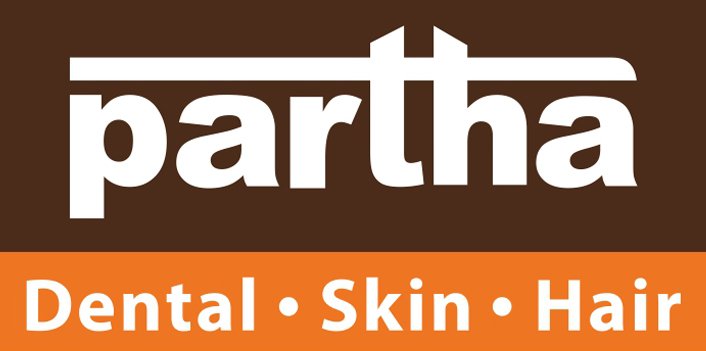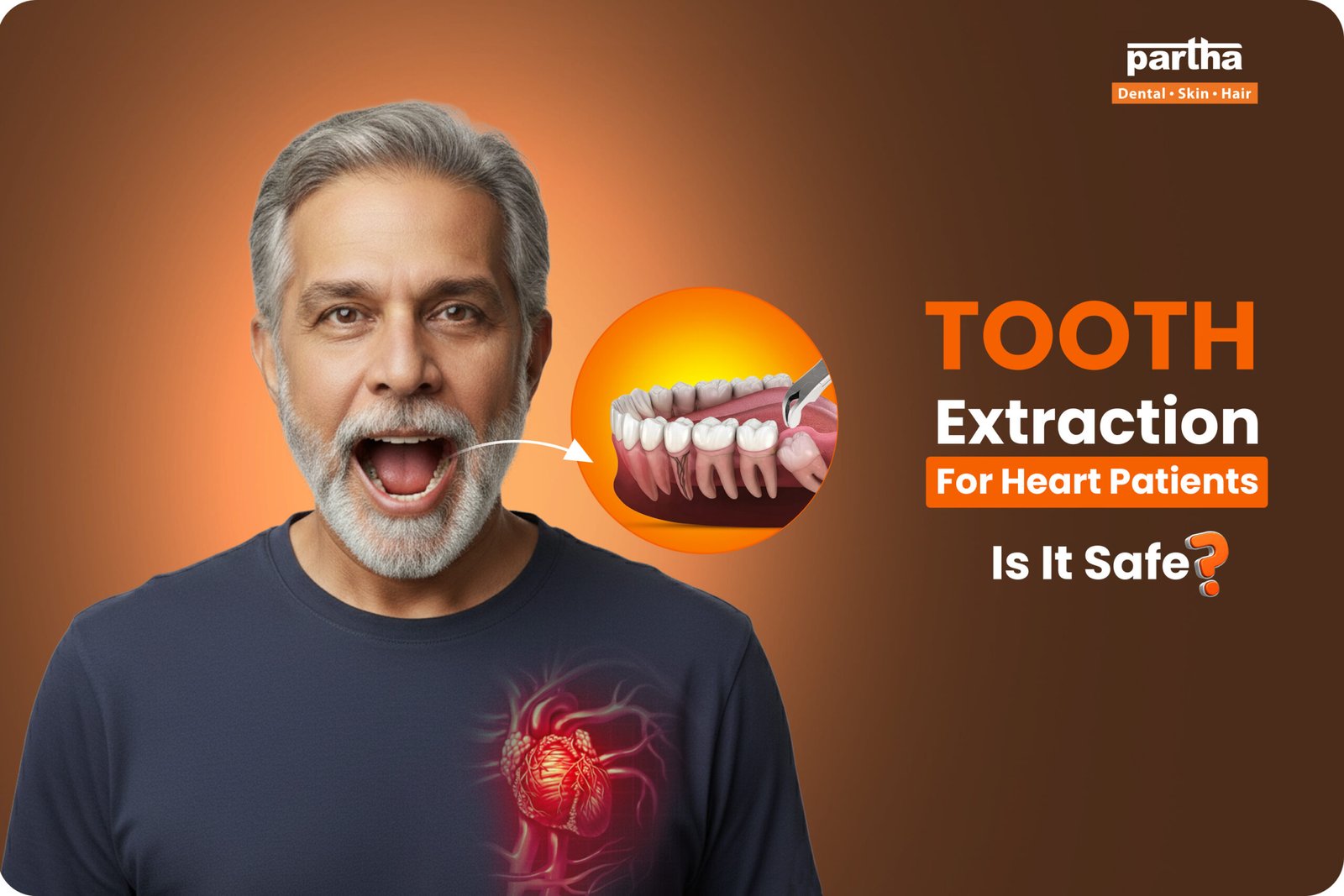Welcome to another heart-to-tooth conversation from Partha Dental where we love your smile almost as much as we care about your heartbeat!
This time we will be looking at something that makes a lot of you anxious — tooth extraction for patients with heart disease. You might be thinking — “Wait, can I even have my tooth extracted with a heart condition?” Yes you can! Just like everything in life, it is a matter of timing, coordination, and a little patience.
So, sit back and relax, while we sort out how a tooth removal fits together with heart health.
Your mouth isn’t just a chewing device or accessory to your selfies — it is actually connected to your heart in more than one way.
Bad oral hygiene can lead to increased bacteria in your bloodstream, which can promote inflammation and perhaps even be dangerous to the function of your heart. That’s why, for heart patients, tooth removal should get a little more attention and thought.
If you have heart disease, stents, or a history of heart attacks, your dentist is charged with the responsibility of detective work – examining your medical history, your medications, and your heart condition before they get the chance to think about those forceps.”
1. Tooth Extractions for Heart Patients – What You Should Know
When dentists mention tooth extractions for heart patients, it is not as if we are trying to make too much out of it – it only means to proceed with caution. The procedure itself is not the perpetrator. The key concern is how your body will respond to stress, anesthesia and medications.
Let’s break this down by a few concepts that made the difference.
1. Stress – Heart Health
Even the most relaxed people will clench their fists in the dental chair. Such stress can elevate your heart rate and blood pressure, and that becomes an issue if your heart is already running extra shifts.
Therefore, at Partha Dental, we take steps to ensure you are as relaxed as possible before your extraction. This can begin with some calming conversation, gentle approaches.
2. Anticoagulants and Bleeding
Most individuals with heart disease take anticoagulants — medications that prevent clots, but these medications can make bleeding after the extraction a little bit more difficult to control. Don’t worry though, your dentist will not stop the anticoagulants without speaking to your cardiologist.
Instead, they would control the bleeding with pressure packs, stitches and other local hemostatic measures.
In other words: no drama, no promotion bleeding, and no “oh no” moments.
3. Infection Control
When a tooth is extracted, bacteria is able to enter the blood stream. If you have a specific heart condition, particularly in cases of an artificial biological valve or past history of endocarditis, you will most likely receive certain antibiotics used prophylactically before the extraction procedure.
So when your dentist says, “Let’s go ahead and start the antibiotics a little early,” don’t be startled; just know that they are keeping your heart happy and healthy!
2. Extracting a Tooth for Heart Patients, Step by Step
Now that you have an awareness of why precautions are taken, let’s see what the process looks like for extraction for heart patients.
1. Medical history:
Your dentist will ask about everything, heart attacks, stents, bypasses, etc, valve replacements, pacemakers, medications. Do not leave anything out.
2.Consultation with Physician:
When there is a major heart condition, your dentist will communicate with your physician prior to scheduling your procedure.
3. Modified Anesthesia:
Using pressure packs, eating a soft diet, not smoking, and mostly having a straightforward recovery. You should be back to normal in a few days.
3. Tooth Removal Following Heart Stent Placement – Is It Doable?
If you have had a stent placed in your heart, you would most likely be on dual antiplatelet therapy (DAPT) – normally aspirin and clopidogrel.
Dual antiplatelet therapy is a therapeutic measure to keep your blood flowing through your stent, which is wonderful for your heart, but poses some challenges for a dental extraction.
What is the take home message?
Always speak to your doctor about your heart medications, and never stop your heart medications voluntarily, even for dental purposes. Your dentist and cardiologist will agree together on whether you can continue with the extraction. In general, tooth removal after heart stenting is absolutely possible with precautions in the correct situations.
When it comes to timing, you typically want to postpone elective dental treatments for at least a few months if you have had a stent placed in your heart, except for a tooth that is aggressively malfunctioning, like a tooth that has continued to hang on and can no longer be saved.
In other words, yes, you can get your tooth removed once your heart doctor says you can.
4. How Long to Wait for Tooth Extraction After Heart Attack?
Now let’s answer the most Googled question:
How long to wait for tooth extraction after heart attack?
Here’s the easy way to remember.
If you have survived a heart attack, wait at least six weeks for any non-essential dental work, including extractions.
The reason for this is to allow your heart to recover. Performing any facility inducing procedure too soon could activate complications. In an essential situation – such as a serious infection or abscess – your dentist and cardiologist will develop a course of action, with the possibility of hospital treatment and service.
The second condition is that, in order to achieve the goals, you have to be patient. Let your heart rest before you wrestle with that stubborn molar.
5. What happens if you just ignore it?
People will say, “Let me just deal with this; I don’t want to risk my heart.”
Do not do this.
Delaying treatment leads to the risk of not only infection, but abscess, or inflammation, all of which place more stress on your body, increasing your risk to your heart.
Removing decayed or infected teeth – in most cases will in-debt you less risk to your heart.So avoiding the dentist isn’t protecting your heart — it’s just inviting more trouble.
Important Reminders for Heart Patients Before and After Tooth Extraction Surgery
Here is a playfully written reminder from your friends at Partha Dental:
- Schedule your appointment for the first part of the day. You are relaxed and fresh, and so are they.
- Eat small before coming. My parents always told me, “an empty stomach + nerves (anxiety) = dizziness.”
- Bring a list of your medications.
- Avoid caffeine and energy drinks morning after extraction, at least through lunch time. Your heart will thank you for it!
- During your recovery period after the extraction, take it easy – For 23-24 hours, no exercise, heavy lifting, or dances from the old Bollywood films.
- If the bleeding persists after 30 minutes has passed, you have chest pain, and if you are feeling lightheaded – contact the dentist immediately.
We at Partha Dental believe your smile and your heart require the same amount of care. We work with your doctors to ensure every step towards better oral health is safe, comfortable and stress-free!
You can make an appointment Call us now- 04041420000 Disclaimer: This article is for educational purposes only. Please see your dentist and cardiologist about dental procedures.
6. FAQs
Definitely! Are you stable and cleared for the possible extraction by your cardiologist? Absolutely! Tooth extractions are considered procedure safe for patients with heart conditions as long as you take the necessary precautions.
No, typically not. Most minimal bleeding can be managed easily without a stop in medication by your dentist. Always consult your cardiologist before discontinuing any medications.
Yes, but it can depend on timing. If the last stent was placed within the last 6 weeks your dentist will want to seek consultation with your cardiologist for you, if not it is fine to proceed without one. If it is an emergency situation, it may be safe to proceed; however, extraction may take place in the hospital or medically supervised setting.
Some patients with certain heart conditions, including valve replacement, may require antibiotics prior to receiving dental treatment depending on the risk factors. In most instances, the dentist will make the decision after receiving the entire medical history of the patient.
Yes! A serious infection could cause bacteria to enter your bloodstream and cause an infection of your heart valves or stents.What is most important is, that if you get dental treatment or an extraction, you will need to maintain or start your oral care afterwards. Read more
Dental Questions? We’re here to help!
Disclaimer:
The prices mentioned in this blog are indicative and may vary based on the severity of the condition, technology used, and materials suggested by the Dentist. They are accurate as of the date of publishing and subject to change as per clinic policy. Third-party or AI-generated estimates may not reflect actual clinic pricing. For accurate costs, please visit your nearest Partha Dental clinic.




